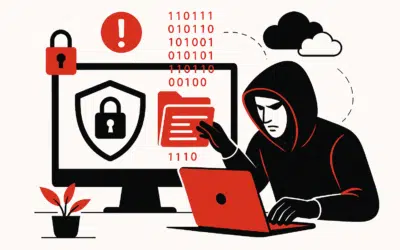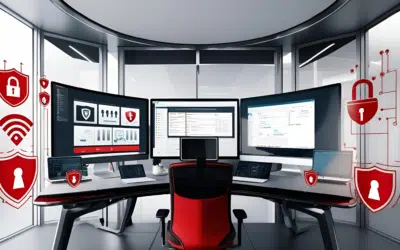With cyberattacks becoming more frequent and sophisticated, it’s no longer enough to rely on security measures from the past. In fact, many of the best practices from just a few years ago are no longer sufficient to provide an adequate level of security to your network and your business.. Your sensitive data, systems, and networks are constantly at risk, and a breach can be catastrophic. This is why having a Security Operations Center, also known as a “SOC,” is essential for protecting your organization.
A SOC serves as the frontline defense for your IT security. It offers 24/7 monitoring, detects threats before they become real problems and responds to incidents to keep your business safe from cyber attacks. It’s a specialized team of cybersecurity experts working behind the scenes to ensure your company’s data and infrastructure remain secure.
In this post, we’ll dive deep into the role of a SOC, breaking down its key functions, components, and the benefits it offers. You’ll also learn why a SOC is crucial for maintaining the security of your business and how to choose the right solution to protect your organization against the growing cyber threats.
What is a Security Operations Center?
A Security Operations Center (SOC) is a specific part of a business that focuses on monitoring, detecting, and responding to cybersecurity threats around the clock. A SOC is staffed by a team of cybersecurity professionals who monitor the organization’s networks, systems, and data for any signs of suspicious activity or vulnerabilities.
It’s primary function is to identify potential security incidents, investigate their causes, and take swift action to contain and resolve the issue before it causes damage. In addition to responding to active threats, a SOC also plays a proactive role by conducting regular vulnerability assessments, threat hunting, and implementing security measures to prevent future attacks. Through 24/7 monitoring, a SOC helps ensure that an organization’s digital assets are protected against a wide range of cyber risks, from malware and ransomware to unauthorized access and data breaches.
Why Your Business Needs a Security Operations Center
It seems like every time you turn on the news, there’s another story about a company getting hacked or losing customer data. And these attacks aren’t just more common – they’re getting sneakier and more sophisticated too.
So, what happens if your business data ends up in the wrong hands? It’s not pretty. You could lose money, damage your reputation, or even get in legal trouble for breaking data privacy laws.
This is where a Security Operations Center (SOC) comes in handy. Think of it as your business’s personal bodyguard, keeping an eye on things 24/7 and jumping into action at the first sign of trouble.
How Does a SOC Work?
A SOC brings together three key ingredients: people, processes, and technology. Each of these components plays an important role, and weakness among any of them will create weakness in the entire SOC:
- People: This is your team of security analysts, incident responders, and managers. They’re the brains of the operation, working together to spot and stop threats.
- Processes: These are the game plans for monitoring systems, dealing with security incidents, and creating reports. It’s all about having a solid strategy.
- Technology: This includes all the high-tech tools and software that help the team spot potential threats. Think of it as the SOC’s toolkit.
Together, these components create a robust security system that keeps your business data locked down tight.
What Does a SOC Actually Do?
A Security Operations Center has three main jobs:
- Real-Time Monitoring: The SOC team is always on the lookout for anything fishy happening in your network. They use smart tech like AI and machine learning to spot potential threats as they happen.
- Proactive Threat Hunting: Instead of waiting for trouble to find you, a SOC goes looking for it. They’re constantly searching for weak spots that hackers might try to exploit.
- Rapid Response: If a cyber threat does manage to slip through, the SOC team springs into action. They work fast to contain the threat and minimize any damage. Then, they figure perform what is commonly referred to as a “post mortem” to determine how the incident was able to happen and how to prevent such an event from occuring again.
How a SOC Protects Your Business Data
A SOC is like a shield for your business data. Here’s how it keeps you safe:
- It fights off nasty stuff like malware, ransomware, and phishing attacks by constantly scanning your network for any sign of trouble.
- It guards your sensitive info (think financial data, customer records, and trade secrets) against unauthorized access.
- It helps you stay on the right side of data protection laws like GDPR and CCPA, so you don’t end up in hot water with regulators.
- It keeps detailed records of all security incidents. This helps improve your defenses over time and shows clients and regulators that you’re serious about security.
Why Your Business Needs a SOC
Still on the fence about getting a SOC? Here are some solid reasons to consider it:
- Round-the-Clock Protection: Cyber threats don’t clock out at 5 pm, and neither does a SOC. You get 24/7 monitoring and protection, giving you peace of mind.
- Cost-Effective Security: A SOC gives you access to a team of experts and top-notch tools without the complications and expense of designing, building, and managing it all yourself.
- Continuous Improvement: As cyber threats evolve, so does a SOC. Every incident or attempted intrusion provides valuable data, giving the SOC the ability to update and improve their defenses for the future.
Choosing the Right SOC for Your Business
When it comes to setting up a SOC, you’ve got two main options:
- Build Your Own: This gives you more control but comes with challenges. You’ll need to hire skilled staff, buy expensive tech, and set up all the processes yourself. This can be expensive and difficult, especially if you don’t have in-house expertise.
- Outsource to a Provider: This is often a more budget-friendly and efficient option. You get access to a ready-made team of experts and cutting-edge tech, without the headache of managing it all in-house.
When picking a SOC provider, look for these key features:
- Advanced threat detection capabilities
- 24/7 support
- Ability to grow with your business
- Knowledge of data protection laws and industry standards
Wrapping Up: Why Your Business Needs a SOC
In today’s digital world, solid cybersecurity isn’t just nice to have – it’s a must. A Security Operations Center offers round-the-clock monitoring, quick threat detection, and effective incident management. It’s not just about playing defense. A SOC also helps you stay compliant with regulations and avoid costly data breaches.
Think about it – can your business afford not to have this level of protection? Get in touch with us today to learn how Axxys SOC services through a trusted network of partners can beef up your defenses against cyber threats.








